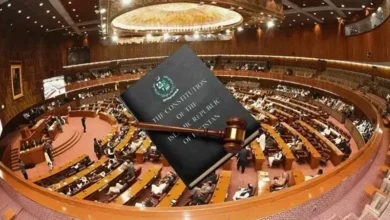The Tehreek-e-Taliban Pakistan, the deadliest militant group in the Pakistan-Afghanistan region after the Afghan Taliban, appears to be staging a comeback in its former strongholds in Khyber Pakhtunkhwa.
In the first two months of 2021, the group claimed at least 32 attacks in Pakistan. SAMAA Digital couldn’t verify the claims made by the TTP but the group is indeed trying to find a way back in its former strongholds and the country’s urban areas.
The killing of two policemen in Islamabad and Rawalpindi in two separate gun attacks on March 7 raised the alarm for Pakistani officials. Soon after the attacks, Interior Minister Sheikh Rasheed said that major cities in Pakistan, including Karachi, Lahore, Peshawar and Islamabad, were under threat from the TTP.
While law enforcers in Islamabad and Rawalpindi are still investigating the attacks, security agencies in Karachi have been on high alert.
Omar Shahid Hamid, a senior counter-terrorism police official, told SAMAA Digital that the TTP’s presence in Karachi can’t be denied.
“The TTP used to have a strong network in Karachi not long ago,” Hamid said. “It doesn’t exist anymore.”
The police official says the group has sleeper cells in Sindh and it’s not easy to detect them.
The police and Rangers have arrested or killed several suspected TTP militants in Karachi, Sukkur and other parts of Sindh in intelligence-based raids this year.
Unification of the TTP
Several groups, which had left the TTP after Fazlullah became its chief, rejoined the militant group last year under Mufti Noor Wali Mehsud. Noor Wali assumed the group’s command after Fazlullah’s killing in Afghanistan in 2018.
The homecoming of several such factions has boosted the TTP’s operational capacity, says Dr Amira Jadoon, a terrorism analyst and a professor at the Combating Terrorism Center in New York.
“Bringing experienced and highly lethal groups back into its fold is one easy way for the Pakistani Taliban to boost their operational capacity,” Dr Jadoon told SAMAA Digital.
The unification of militant groups was the first point on its new emir’s agenda. KP-based journalist Ihsan Tipu Mehsud said that Noor Wali always believed that rifts between TTP leaders weakened the group more than the military operations carried out by the Pakistan Army.
“He used to say that rifts destroyed the TTP and not the military operations,” the journalist said. Fazlullah was not a Mehsud Taliban (the founders of the group from the Mehsud tribe) and it weakened him as a leader, he said.
Pakistani security forces have killed hundreds of militants across the country in operations such as Zarb-e-Azb and Raddul Fasaad. The raids drove TTP fighters and leaders out of their strongholds in KP to the neighbouring Afghanistan.
“The attacks in North and South Waziristan have increased,” the journalist said. “Most of the attacks are carried out by Mehsud Taliban.”
Other experts believe that military operations are not enough to defeat groups such as the TTP.
“The Pakistani state’s response to the TTP was limited to a kinetic one, in the form of the Zarb-e-Azb military operation,” argued Dr Madiha Afzal, a fellow at the Brookings Institution in Washington and the author of Pakistan under Siege: Extremism, Society and the State.
She said the country didn’t pay any attention to countering extremism in the population.
“Given that, it was only a matter of time before the group resurfaced — its pool of recruits to draw from remains intact,” she added.
‘Winning the hearts and minds’
Tipu says the TTP has focused most of its attacks on the police and security forces since it reorganized itself last year.
The attack on female NGO workers in North Waziristan last month was carried out by a splinter group and not the TTP itself, he added.
“The TTP appears to be following the strategy of winning the hearts and minds of local population,” the journalist said.
The attack left at least four women dead in North Waziristan’s Mir Ali area on February 23. According to the Pakistani military, the attack was carried out by the TTP’s Hafiz Gulbahadur group.
The TTP has not only increased attacks but intensified its propaganda too. For the first time in four years, it has released a statement on Aurat March.
On March 8 every year, women in Pakistan take to the streets to demand their rights and better opportunities. Right-wing groups have been opposing it since 2018 and their members actively try to counter the march on the streets as well as on social media platforms.
The TTP through its statement tried to cash in on the anti-Aurat March sentiment in the country.
“We want to send a message to the organisations that are actively spreading obscenity and vulgarity in our beloved Pakistan,” it said, referring to the marchers.
“Fix your ways, there are still many young Muslims here who know how to protect Islam and the boundaries set by Allah.”
Dr Jadoon sees the TTP statement against Aurat March as an attempt to become “politically relevant” in the country.
“Their statement against Aurat March shows that they are trying to increase their influence and visibility, and potentially appeal to audiences who may be against Aurat March,” she said.
Madiha Afzal had similar thoughts. She said the Pakistani state needs to “forcefully counter the TTP’s recent public statement, including those targeting Aurat March”.
“Branding the TTP as an Indian conspiracy against Pakistan, as the state has done, without heeding on its local roots is a misguided and an ultimately counterproductive approach,” the author said.










